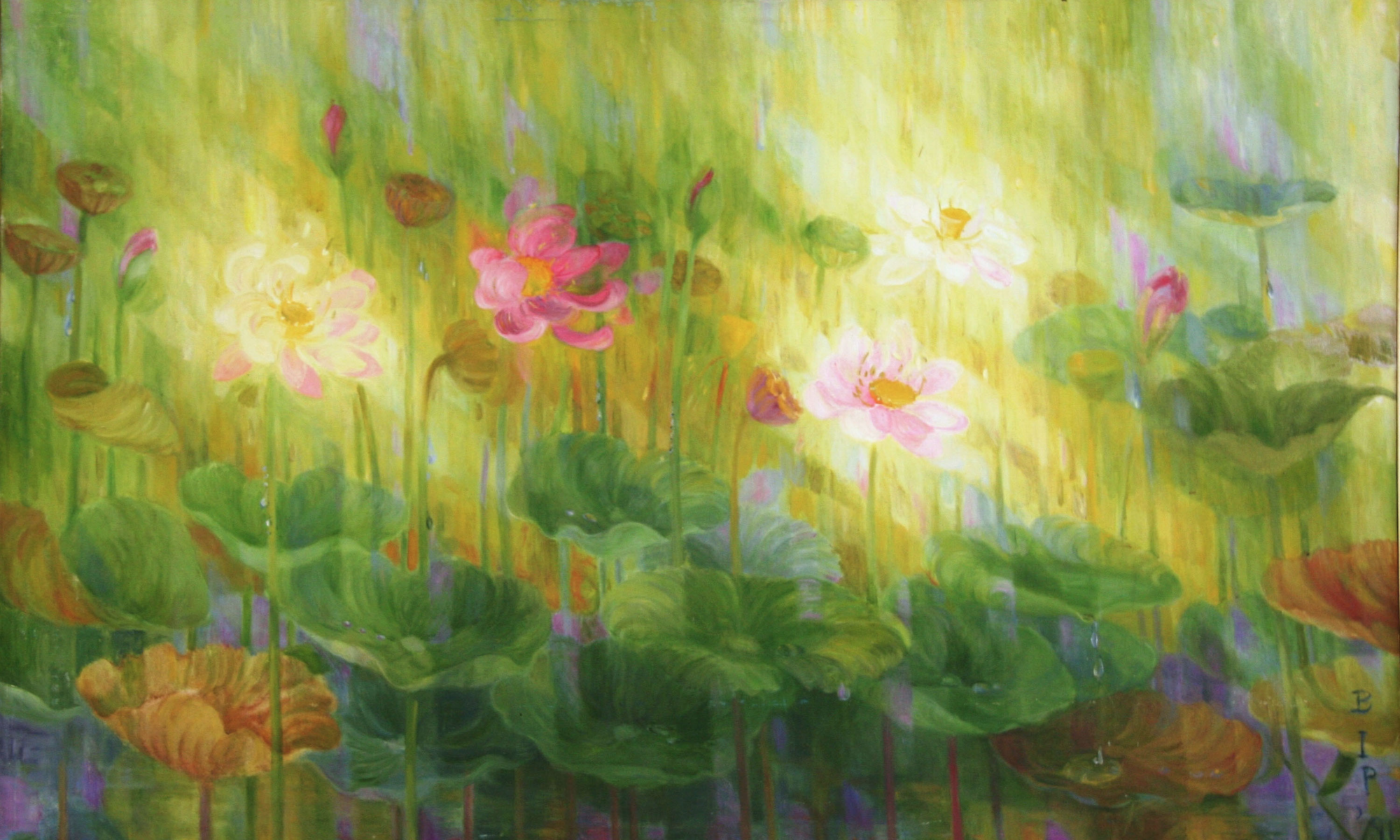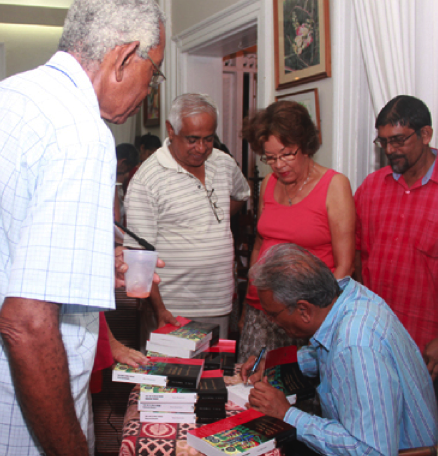Activity: Book Launch
Co-ordinator: Moray House Trust
Date: Tuesday 30 April 2013
‘The Sky’s Wild Noise’, a book of essays by Dr Rupert Roopnaraine, was launched at Moray House Trust. In it, Dr Roopnaraine writes about Guyanese politics, Guyanese literature and Guyanese art. In one essay, The State of Cultural Enterprises in the Caribbean (2000), he argues, that “if we agree that culture is at the centre of the possibility of the good life, then what we need in order to arrive at the pathways leading to the good life is a radical uplift in cultural values, at a very basic human level.”
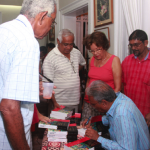
His essays analyse the work of Guyanese politicians such as Cheddi Jagan, Desmond Hoyte and Walter Rodney and Guyanese writers and artists such as Edgar Mittelholzer, Philip Moore, Hawley Harris and Stanley Greaves. In an essay about Guyana’s most famous poet, Dr Roopnaraine observes that “Martin Carter contributed not only to the quantity of the national movement but to its quality. He educated us into the habit of thinking and proposed for our consideration a politics of decency rooted in the moral sense.”
At the launch, there were readings from selected extracts and the author and the publisher, Peepal Tree Press, also talked briefly about the book.
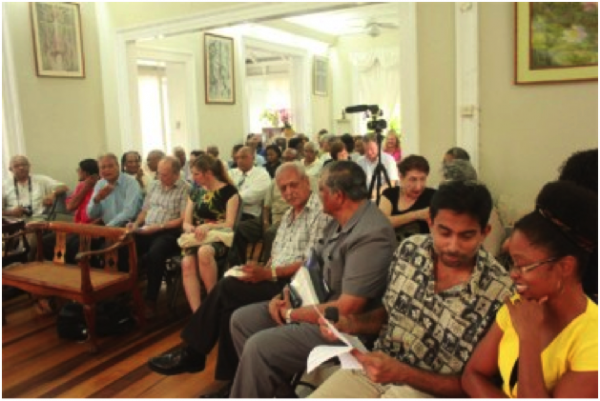
The collection of essays won the 2013 OCM Bocas category prize for non-fiction. The panel of judges, headed by historian Richard Drayton, paid tribute to the work: “in the corpus of non-fiction prose in the Caribbean intellectual tradition, only José Martí and George Lamming rival the range of Roopnaraine’s capacities of response, depth of analysis, and subtle and mordant style.”
Video Clips
Introduction:
You Tube Clip: http://youtu.be/vWDygRMgxOo
Vanda Radzik introduced readings from ‘The Sky’s Wild Noise’ by Dr Rupert Roopnaraine at the book’s launch at Moray House Trust in April 2013.
Part 1: ‘Soppy’
You Tube Clip: http://youtu.be/yJ9Avp6ut8E
Vic Insanally read Rupert Roopnaraine’s tribute to the famous Guyanese teacher, linguist and lexicographer, Professor Richard Allsopp. Allsopp compiled the Dictionary of Caribbean Usage and described his mission as one to ‘link up cultural roadways.’
Part 2: ‘Teach the Free Man How to Praise’
You Tube Clip: http://youtu.be/K1xUclret30
Karen De Souza read Dr Roopnaraine’s moving tribute to Guyanese poet, Martin Carter in this extract from ‘The Sky’s Wild Noise’. The collection of Dr Roopnaraine’s writing was launched at Moray House Trust in April 2013. Roopnaraine memorably evokes Martin Carter’s ‘inescapable duty of seeking the truth and proclaiming it.’
Part 3: ‘Philip Moore of Guyana and the Universe’
You Tube Clip: http://youtu.be/4AtNTIT4GLo
Philip Moore was a distinguished Guyanese artist. Dr Rupert Roopnaraine celebrates Moore’s ability to build cultural bridges in this evaluation of his work first published in Caribbean Beat in the 1990s. Akima Mc Pherson read this extract.
Part 4: ‘Sharing, Solidarity and Togetherness’
You Tube Clip: http://youtu.be/v7ZCiugl6_U
‘I believe that there is no greater nor more urgent task confronting us today in our troubled, tormented country than the overcoming of the accumulated bitterness and fears of the past…’ In this essay, Dr Rupert Roopnaraine turns to the examples of Nelson Mandela (‘the apostle of reconciliation’), Mahatma Ghandi and Nadia Bishop, daughter of Maurice Bishop of Grenada to promote his thesis that ‘we must embrace reconciliation and aspire to a higher humanity.’ The essay was read by Vidyaratha Kissoon.
Part 5: Resonances of Revolution
You Tube Clip: http://youtu.be/8hQhVPu9vQo
This extract from Dr Rupert Roopnaraine’s ‘The Sky’s Wild Noise’ was chosen and read by Major General (rtd) Joe Singh. In her foreword, Dr Alissa Trotz identifies a recurring theme in the collection of essays: the necessity of altering our norms of political conduct.
Part 6: An Editor and a Writer
You Tube Clip: http://youtu.be/RpblaKbL_Qs
Jeremy Poynting of Peepal Tree Press reflected on his enduring relationship with Dr. Roopnaraine.
Part 7: Remarks from the Author
You Tube Clip: http://youtu.be/zrIshaoSa-w
Dr. Rupert Roopnaraine made a few remarks about ‘The Sky’s Wild Noise’ and his trip to the Bocas Festival in Trinidad.
Press Clippings
Rupert Roopnaraine’s Launch of “The Sky’s Wild Noise: Selected Essays”
by Russell Lancaster
On Tuesday 30th April, I had the distinct privilege of being one of the guests at the launch of Rupert Roopnaraine’s “The Sky’s Wild Noise: Selected Essays” published by Pepal Tree Press Limited. And I say privilege, not because of the calibre of personages among whom I found myself, nor the beauty of the discourse, nor the appropriateness of the surroundings, but because of the exquisite sublimity of the experience. There, in a room, in a house left by David de Caires to be a repository of ideas we saw the potentiality of what Guyana can become should we choose to look beyond the darkened prisms of our prejudices.
There, at an event hosted by the Moray House Trust we saw the co-mingling of writers, artists and politicians who in one instant threw off their cloaks of importance and became citizens, regular folk, reveling in the achievement of one of our own, himself a supremely humble man with a prodigious talent for words and their importance to our life experience. I asked him to autograph his book for me and he wrote, simply, “We write because we must,…Rupert”. That this imperative propels such an outpouring seems to me to suggest that we are indelibly imprinted with our passions for certain things. For each of us has passions, callings from which we cannot divide ourselves, and as I walked around that room and saw the faces gathered I realized that each represented contributions that cannot be underestimated in our collective journey. Magda Pollard, Dr. Neville Trotz and his daughters Drs. Alissa and Maya and their mother Marilyne, Sister Mary Noel Menezes, Professor Vibart Cambridge, Dr. Ian McDonald, Vic Insanally, Dr. David Singh, Major General (r’td.) Joe Singh, David Granger, Raphael Trotman, Minister Dr. Frank Anthony, Elizabeth Deane-Hughes, Jocelyn Dow, and Akima McPherson were among the many who took time out to be there.
Vanda Radzik, who chaired the proceedings, and who is also sits as Chair of the Moray House Trust, in her introduction, made special acknowledgement of the foreword written by Dr. Alissa Trotz and this set the tone for and urbane and measured discourse delivered in the voices of our time. As we listened to Rupert’s words we were given an insight into the complex thinking of one man and the multitudinous threads that distinguish a society’s progression in a particular time. From his days at school, to the people he has shared his time with, to his ideas about art and politics; we were introduced in one short hour to the relevance of this book for all of us, not only as Guyanese but also as world citizens; for this book transcends the boundaries of any limited physical or intellectual space. Already acknowledged as a most outstanding non-fictional work at the recent Caribbean Writer’s Festival, Dr. Ian McDonald in his closing remarks made mention of the value of this book to the repertoire of world writing.
Sitting there, in that room in Moray House, among the paintings of Bernadette Persaud, George Simon and Ron Savory, with its crumbling plaster walls, in a settee that David deCaires must have enjoyed, I was transported to a Georgetown of my utopic imagination. The people, the discourse, the subtle energy took me away from reality for just a moment. This is what we can really be; we can find places of commonality even as we express our different viewpoints. And I knew then that this is what we are, if even for a moment. And at its end, as we made efforts to get our copies autographed and met friends we had not seen in many days, and took our leave, I walked out of the doors of Moray House and back into reality. On the road as I walked to the Stabroek market, along pavements strewn with garbage and men and women ralaxing and taking a drink just before the holiday, and music blaring from pushcarts, and the stench of the city, the words of Magda Pollard, whispered as we chatted after the launch, sounded in my ear, “What a lovely evening”.
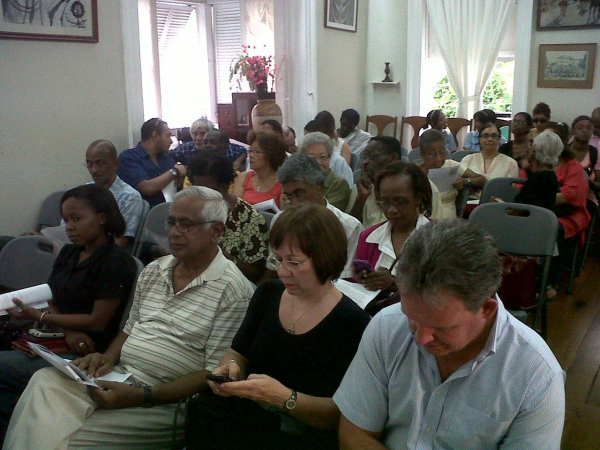
‘From Trinidad to Guyana’
May 6, 2013 · Stabroek News’ “In the Diaspora” Column
By Jeremy Poynting, Managing Editor of Peepal Tree Press
We came to Guyana after four days at the Bocas Litfest in Trinidad and Tobago. There, Rupert Roopnaraine and Ian McDonald were Guyana’s direct representatives, and it was a delight to meet up again with Cyril Dabydeen, Guyana via Canada, after many years. Cyril was one of the competition judges and also gave a dynamic poetry reading. Ian McDonald was interviewed by Nicholas Laughlin and read from his new collection of poems, The Comfort of All Things. His was a very warmly received presence, not just for the beautiful new poems, but for sharing the accumulation of a lifetime’s wisdom that has an immense generosity of spirit at its heart. Many people told us that they thought that Rupert Roopnaraine’s The Sky’s Wild Noise, winner of the non-fiction prize, would win the overall OCM Bocas prize. It didn’t, but Rupert got one of the biggest cheers of the festival when he spoke about coming from the Guyana budget debates where words were used to wound and divide, to the nourishment of the festival where words were used to enrich and unite. Kendel Hippolyte’s Fault Lines, the other finalist as winner of the prize for poetry, was also published by Peepal Tree. The overall prize was won by Monique Roffey’s novel Archipelago.
For me, the outstanding feature of the festival, beyond the quality of the writers brought to it and the huge efficiency of the organisation, is that it is a genuinely pan-Caribbean festival with writers from all parts of the region. The enthusiastic reception of this spread of writers by a mainly Trinidadian audience is ample evidence that the ideal of Caribbean unity can exist in literature, if nowhere else. The other winning combination at Bocas Litfest is the way it brings together developing writers in its Showcase sessions, as well as long-established, internationally known writers. One of the festival highlights was the launch of Trinidadian Barbara Jenkins’ first book, her collection of stories, Sic Transit Wagon. Barbara was one of the showcase new talents two years ago, heard by Peepal Tree and published to huge acclaim by an audience who gave her a standing ovation and bought a record total of nearly two hundred books following the event. Barbara Jenkins was also the winner of the new Hollick-Arvon prize, an award for developing writers that includes money to enable time to write. This is an award that Guyanese writers need to have on their radar – and I didn’t say young writers; Barbara Jenkins is 71. It is never too late.
In so many ways for Peepal Tree it was a very gratifying festival. For a start, plenty of our books were bought – no fewer than four Trinidadian booksellers have bookstalls at the festival. On the prize-giving night, it was noted by the chief judge, the Jamaican writer Olive Senior, that Peepal Tree had a very high proportion of the longlisted books and two out of three of the shortlisted winners. That kind of pat on the back always does a great deal to re-energise us for the future. But the festival, as well as being about the opportunity to listen to writers read from and talk about their work, and participate in lively debate, is about the people who come together to share. This is a festival full of warmth and good feeling. We had the opportunity to meet again some of the writers we have published such as James Aboud, Ifeona Fulani and Kendel Hippolyte, and some we have never met such as Marion Bethel from the Bahamas; we took pleasure from the positive response to writers with new Peepal Tree books such as Diana McCaulay from Jamaica with her novel, Huracan, and Roger Robinson from Trinidad and the UK. I know that for Roger the festival was made when Ian McDonald bought his new book of poems, Butterfly Hotel, and asked him to sign it. The festival was also the opportunity to discover good new writers we don’t publish such as Kerry Young, with her novels of Chinese Jamaican life, Pao and Gloria, and Hannah Lowe with her poetry collection, Chick. It’s a chance, too, to sit down with younger writers whose work Peepal Tree will almost certainly publish, such as Danielle Bodoo-Fortune, a fine young poet whose favourite poet is, incidentally, Guyana’s late, great Mahadai Das.
One of the important and very well attended sessions was the CaribLit launch. This important initiative, funded by the Commonwealth Writers Prize and the British Council, recognises that writers based in the Caribbean region are at a significant disadvantage compared to their compeers in the North American and British diasporas with regard to access to publishing and infrastructures of support such as writer-development programmes. CaribLit is the outcome of meetings at last year’s Bocas that brought together writers, publishers, festival organisers and literary activists in the Caribbean Literature Action Group (CALAG). The outcomes so far include the appointment of a co-ordinator, the very energetic and highly organised Kellie Magnus from Jamaica, whose first task, the construction of a CaribLit website (cariblit.org) as a portal for writers to access information about publishing, courses, workshops, prizes etc, was launched at the festival. In addition, there is the Hollick-Arvon prize for new writers whose first award was made this year and CODE, the Canadian funders, announced the launch of the Burt award for writing for children and young people (http://www.codecan.org/burt-award-caribbean). More informally, two of the CALAG invitees, Peepal Tree Press and Akashic Books from New York, who also have a significant Caribbean list, came together to agree to the launch of a new joint imprint (name as yet unknown, watch out for a competition on cariblit.org) dedicated to publishing first books by writers based in the Caribbean. The first fruit of this will be the publication of the best of the short stories from the Commonwealth Writers Prize competition in time for next year’s festivals. The intention is that, where appropriate, selected writers will be offered a mentoring relationship with an experienced Caribbean writer (several made such a commitment at last year’s CALAG meeting) so that publication goes hand in hand with opportunities for writer development.
One of my concerns arising out of the CaribbeanLit initiative is that Guyana seems somewhat off the regional map, and I’m committed to seeing what can be done to remedy this situation. My feeling is that support for writers, publication and literature in general works best when it operates at arm’s length from government, whatever its political persuasion. This is how the Jamaican Calabash festival has worked and how the Bocas Litfest works, with no-strings-attached funding from business and state corporations such as the National Gas Corporation in Trinidad. It is how the Arts Council in the UK works. Praise is due to the Guyana government for allocating funding to literature and the arts, but I think that it ought to be possible to set up an independent funding body of respected individuals who represent all sectors of Guyanese society, to develop and model institutional practices that ensure transparency in the allocation of public funds, with stringent requirements for bidding for, reporting and accounting of the use made of those funds. Such a body could, I’m sure, win support across the society and take the whole issue of support for the arts and literature out of a narrowly political context. The recent controversy around the operation of the Caribbean Press makes a strong case for such a development.
We came to Guyana to do two things, as well as to reacquaint with a country I’ve been visiting since 1976. We came to launch Rupert Roopnaraine’s The Sky’s Wild Noise at the Moray House Trust in association with Lloyd Austin’s bookshop, and to run a workshop for writers at Moray House. One of my introductory remarks was to praise the heroic efforts of Lloyd Austin to run such an excellent bookshop in the face of widespread piracy, sadly, it seems, at one point condoned by the government. Lloyd’s shop is like the best kinds of bookshops of thirty years ago – that is an unequivocal compliment, since most bookshops in the UK have declined in quality over the past thirty years with pile-them-high, narrowed ranges of stock. What’s impressive about Austin’s holdings of Caribbean literature is that it ranges across the region, whilst too many Trinidadian or Jamaican booksellers tend to be more narrowly island-centric.
The launch itself in the beautiful surroundings of Moray House, organised by the indefatigable Vanda Radzik and Joan McDonald (who it was a delight to meet again after nearly twenty years) was a model of good organisation. There were well-delivered readings from across the range of the book, dealing with Martin Carter, Walter Rodney, Phillip Moore amongst others, brief statements from publisher and author, tasty food and the chance to talk with old and new friends. It was good to see some representatives of the main political parties present, including Minister of Culture, Youth and Sport, Dr Frank Anthony.
The following day we met up with some of Guyana’s writers at a workshop at Moray House, attended by well over twenty or so people, including people known to us such as Kojo McPherson and Ruel Johnson, and an enthusiastic group of writers of a range of ages, but mostly young. We attempted to outline how publishing works in its economic, social and geographic contexts, including the power of the market, and the decisions that writers had to think through in choosing where to direct their work. There were some excellent questions and keen discussion about how Guyanese you could be in your language and reference if you also wanted to reach a wider Caribbean and beyond that an international readership. Our Peepal Tree advice was to write for a Guyanese readership in the first place – sometimes a very local term might be the only one that would do – but think about the contextual placing of such words. Above all, we advised, don’t clog up the work with explanation. We argued that really good writing can be intensely local in its reference, but have the legs to travel to an international readership. We gave the example of one of the international guests at the Bocas Litfest, the Scottish writer Irving Welsh (of Trainspotting fame) who was reading from his prequel, The Scagboys. Welsh writes in Scots, with a vocabulary as distinct from English English as any Caribbean Creole. Skilful use of context, the raw poetry of the language and the willingness to trust the reader to engage with the new had carried Welsh’s outstanding and darkly comedic gifts to a huge international readership.
Above all, we encouraged the writers at Moray House to engage with the cariblit.org website, to pursue the new opportunities for publication and prizes that the site will promote, and engage with the CaribLit group – Guyanese writers need to make themselves known in a wider setting. I’m convinced that writers need to be challenged by the friendly competition of their peers (and read the best of those who went before) if they are to develop their literary ambitions and writing skills and realise whatever raw talent they might have. From the 1950s to the 1990s, Guyana made a huge contribution to Caribbean Literature; it can do so again. One possibility we have agreed to go away and explore is whether there might not be an extension of future Bocas Litfests in partnership with some Guyanese organising group to make use of the fact that so many good Caribbean writers will be already next door in Trinidad and Tobago.
